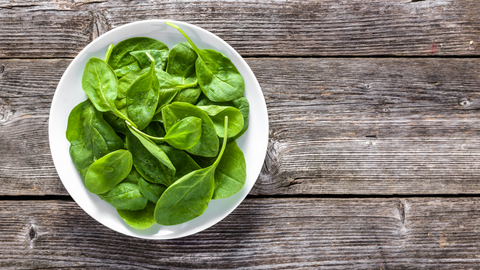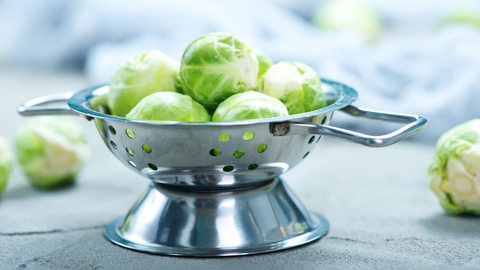GETTING VITAMIN K: 8 FOODS YOU SHOULD BE EATING
There’s always been a lot of hype about Vitamins A, B, C, D and E. When the pandemic struck, Vitamins C and D gained a lot of popularity, becoming the go-to vitamins for boosting the immune system. We rarely talk about Vitamin K, although it is an essential nutrient too.
Vitamin K helps your blood clot and bones grow. It protects you from bone diseases like osteoporosis and keeps heart diseases at bay.
Some foods are rich in Vitamin K and can help you up your AI (Adequate Intake) which is 90 micrograms for women and 120 micrograms for men.
Leafy Greens
Spinach, collard greens and kale are leafy greens that are Vitamin K-rich. Kale, in particular, is a powerhouse for Vitamin K. A half-cup of cooked kale gives you 561 micrograms (mcg) of Vitamin K. If eaten raw, the same half-cup gives you 250 mcg. Moreover, eating raw spinach in a salad or smoothie gives you about 75 mcg for the same half-cup serving. Eating raw leafy greens gives you less Vitamin K than when you eat them cooked.

Fruits
Fruits are not as rich in Vitamin K as veggies, but you can include them in your meals to vary your diet. Apples, avocadoes, prunes, blueberries, and grapes can give you a good dose of this vitamin. For instance, a half-cup of stewed prunes increases your Vitamin K by 32 mcg, and a cup of sliced avocado gives you 50 mcg of the vitamin. Also, you get 11 mcg from a half-cup of grapes and 5 mcg from a small apple.

Other Veggies
If you want to up your Vitamin K intake, then vegetables are your go-to source for this vitamin. However, leafy greens are not the only vegetables that you should be eating. You can opt for Brussels sprouts, raw watercress, frozen okra, green cabbage, scallions, frozen asparagus and broccoli. These are also rich in dietary Vitamin K. Did you know a half-cup serving of either roasted Brussels sprouts or broccoli gives you 110 mcg of Vitamin K?
Pro Tip:
Having about ten sprigs in a parsley meal can boost your Vitamin K.

Oils
Oils are packed with the most common form of Vitamin K called phylloquinone. Cooking with oils like soybean oil and canola nets you 25 mcg and 10 mcg of Vitamin K per tablespoonful, respectively.

Nuts
Nuts do not only contain fibre, proteins, healthy oils and other nutrients that are good for your heart but Vitamin K as well. So raid a bowl of pine nuts, cashews or mixed nuts for a snack at midday. Better still, put some pine nuts into a pasta dish. You’d be surprised how the little you consume goes a long way to increase your Vitamin K levels, especially when taken over a long period.

Fish
If you want to increase your Vitamin K intake, you have to put fish on your menu. Cooked salmon and shrimps contain small amounts of Vitamin K, but canned tuna is loaded with it (37 mcg per serving of 3 ounces).

Spinach Noodles
Spinach noodles could be a better option than pasta and the Vitamin K booster you may be looking for. Why not add the same amount of tomato paste or marinara to your spinach noodles to up the Vitamin K in your meals? Or eat more pizza or tomato sauce entrée the next time you are eating out? It would make a lot of difference in your body’s Vitamin K levels.

Fermented Soybeans
This is a Japanese delicacy called natto. It’s chockfull of Vitamin K. In fact, only a 3-ounce serving can give you 850 mcg of Vitamin K. And that is indeed a lot!

To get enough Vitamin K from the foods you eat, this is what you need to do:
- Cook frozen veggies. Frozen veggies that have been cooked have more Vitamin K than raw veggies. This is because frozen veggies lose water which makes the Vitamin K in them more concentrated.
- As much as possible, avoid eating veggies raw. Cooked veggies contain more Vitamin K than raw veggies.
Warning: Talk to your doctor about how much Vitamin K you should be getting from your diet if you are on medications like warfarin, antibiotics, medications to lower cholesterol, and orlistat (a weight loss drug). This is because these medications, particularly, warfarin, thin your blood, and so, to make sure they work effectively, you need to ingest the same amount of Vitamin K every day. Warfarin works against Vitamin K (which makes your blood clot) and will rather cause your blood to clot more slowly than if you were not on the medication. You also need to seek your doctor's advice about multivitamins or supplements you may be thinking of taking.
Disclaimer: The information shared by this post is for informational purposes only. It is not meant to be professional medical advice nor a substitute for professional medical advice, diagnosis or treatment. Consult your physician concerning anything you have read here.
By Nana Ama Afoa Osae I Writer I GreatWonderful Team
Leave a comment and share this post on social media.
Follow Us On Twitter, Facebook, Pinterest and Instagram @grtwonderful

Laissez un commentaire
Veuillez noter que les commentaires doivent être approuvés avant d'être affichés